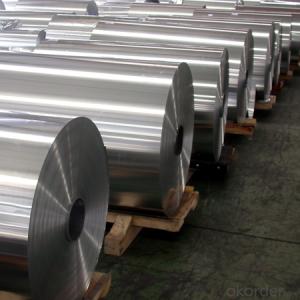Aluminum Coils 5052 Temper H32 0.8mm 1.5mm Thick 900mm 1000mm Width
- Loading Port:
- Shanghai
- Payment Terms:
- TT OR LC
- Min Order Qty:
- 5 m.t.
- Supply Capability:
- 6000 m.t./month
OKorder Service Pledge
OKorder Financial Service
You Might Also Like
Item specifice
Aluminum Coils 5052 Temper H32 0.8mm 1.5mm Thick 1000mm Width
1050 1060 1070 1100 1235representative series aluminum plate is also known as pure aluminum, in the series in 1xxx series belongs to all the alumina quantity of a maximum number of series. Purity can achieve 99.00% above
3xxx series aluminum represents 3003 3004,3005, 3 A21 primarily. And can be called in the 3xxx series aluminum antirust aluminum production process more outstanding. The 3xxx series aluminum plate is by manganese as the main component. Content at 1.0-1.5 between. Is a rust-proof function better series. Conventional application in the air conditioning, the refrigerator, such as car in damp environment.
6xxx series represents 6061 mainly contain magnesium and silicon of two elements, so focused on the 4000 series and the advantages of the 5000 series 6061 is a cold treatment aluminum forging products, apply to fight against corrosion, oxidizing demanding applications.
Description
item | 1050 1060 1100 3003 Aluminum coil | |
Standard | GB/T3190-2008,GB/T3880-2006,ASTM B209,JIS H4000-2006,etc | |
Material | 1060,1050,1100 3003,3103,3004,3005,3105 5052, 5454,5754 | |
Size | Thickness | 0.5mm-3.5mm |
Width | 800-1500mm | |
Weight/Roll | About 1.5MT/3MT | |
Quality control | Mill Test Certificate is supplied with shipment, Third Part Inspection is acceptable. | |
Surface | Bright, polished, hair line, brush, checkered, embossed, etc | |
Trade terms | Price term | ,FOB, CNF, CIF, etc |
Payment Term | TT,L/C | |
MOQ | 2MT | |
20 GP Capacity | About 20-25MT | |
Delivery time | 1.The products will delivery immediately after receiving the payment. 2.According to the order quantity, prompt delivery. | |
Export to | Ireland,Singapore,Indonesia,Ukraine,Spain,Canada,USA,Brazil,Thailand,Korea,Iran,India,Egypt,Kuwait, Oman,Viet Nam, South Africa, Dubai, Russia, etc | |
Package | Stick blue film→plastic film→waterproof paper→1~2 tons on a export standard pallet(corner protection) | |
Application | 1)Further making utensil.2)Solar reflective film3)The appearance of the building4)Interior decorating:ceilings,walls,etc.5)Furniture cabinets6)Elevator decoraction7)Signs,nameplate,bags making.8)Decoration inside and outside the car9)Household appliances:refrigerators,microwave ovens,audio equipment,etc.10)The consumer electronics:mobile phones,digital cameras,MP3,etc. | |
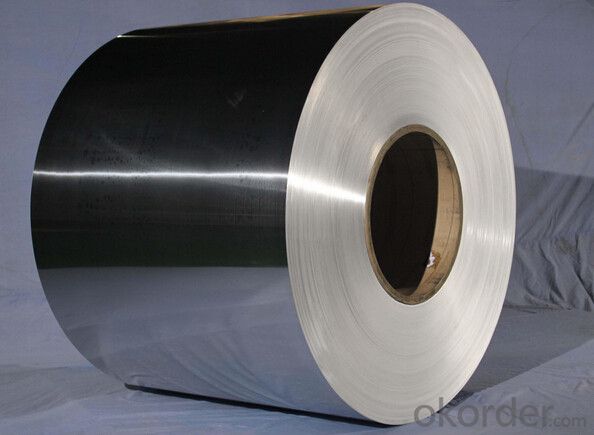
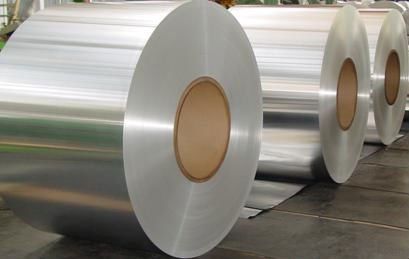
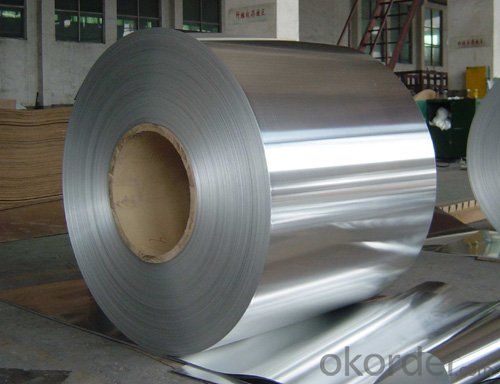
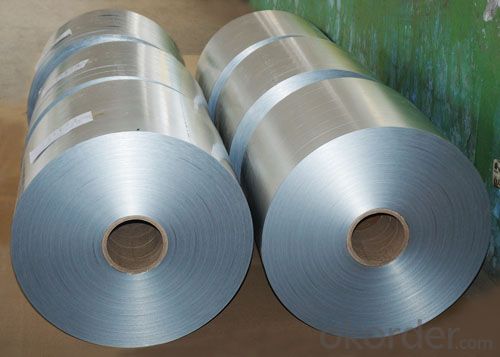
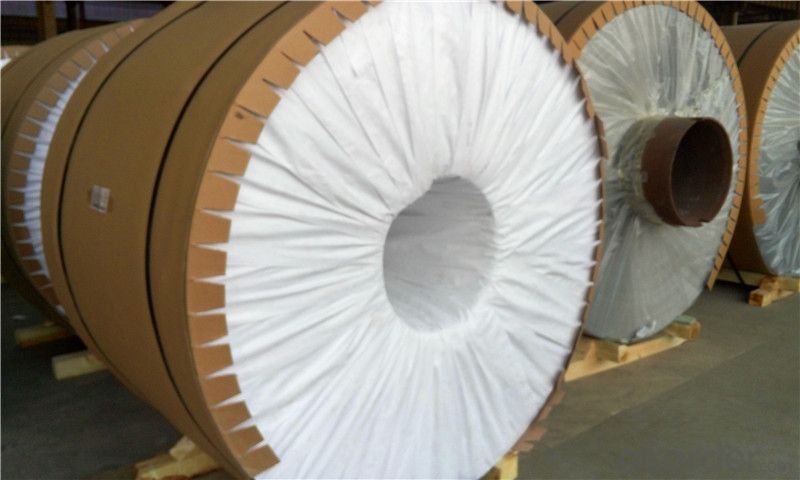
- Q:Can aluminum coils be recycled multiple times without losing their properties?
- Yes, aluminum coils can be recycled multiple times without losing their properties. Aluminum is a highly recyclable material and can be melted down and reused indefinitely without any significant degradation in its properties. This makes aluminum coils a sustainable and environmentally friendly choice for various applications.
- Q:What are the common industry standards for aluminum coil specifications?
- The common industry standards for aluminum coil specifications are established by various organizations such as the Aluminum Association (AA) and the American Society for Testing and Materials (ASTM). These standards ensure uniformity and consistency in the manufacturing and use of aluminum coils across different industries. The Aluminum Association (AA) sets the standards for aluminum alloys and their respective temper designations. The AA standards classify aluminum alloys based on their chemical composition and mechanical properties, allowing manufacturers to produce coils with specific characteristics suitable for different applications. For example, AA 3003 is a commonly used alloy for general-purpose coils, while AA 5052 is often used for marine applications due to its higher corrosion resistance. In addition to alloy classification, the AA also provides guidelines for coil dimensions, tolerances, and surface finishes. These specifications help ensure that aluminum coils meet the required dimensions and quality standards, allowing for easy integration into various manufacturing processes. The American Society for Testing and Materials (ASTM) also plays a significant role in setting standards for aluminum coil specifications. ASTM provides guidelines for various tests and procedures to assess the quality and performance of aluminum coils. These tests include mechanical property testing, such as tensile strength and elongation, as well as tests to evaluate surface finish, corrosion resistance, and dimensional stability. Furthermore, industry-specific standards may exist for certain applications. For example, the automotive industry may have its own set of standards for aluminum coils used in vehicle manufacturing, ensuring compliance with specific performance requirements. Overall, the common industry standards for aluminum coil specifications encompass alloy designation, dimensional tolerances, surface finishes, and mechanical properties. Adhering to these standards ensures consistency, quality, and compatibility across different industries and applications.
- Q:What are the advantages of using pre-painted aluminum coils?
- There are several advantages to using pre-painted aluminum coils. Firstly, pre-painted aluminum coils offer a wide range of colors and finishes, allowing for greater design flexibility. This means that manufacturers and designers can easily match the desired color scheme or aesthetic of a project, whether it be for architectural applications, signage, or consumer products. Additionally, pre-painted aluminum coils are highly resistant to corrosion and wear, making them ideal for outdoor applications. The paint coating acts as a protective layer, preventing the aluminum from oxidizing or deteriorating over time. This durability ensures that the coils can withstand harsh weather conditions, UV radiation, and other environmental factors, prolonging their lifespan and reducing maintenance costs. Moreover, pre-painted aluminum coils are lightweight yet strong, making them easy to handle and install. This lightweight nature also contributes to energy efficiency, as it requires less energy to transport and maneuver the coils during installation compared to heavier materials. Another advantage of using pre-painted aluminum coils is their sustainability. Aluminum is a highly recyclable material, and the pre-painted coating can be easily stripped off, allowing the aluminum to be recycled and re-used. This promotes a circular economy and reduces waste. Lastly, pre-painted aluminum coils are cost-effective. The pre-painted coating eliminates the need for additional painting or finishing processes, saving time and reducing labor costs. Additionally, the long lifespan and low maintenance requirements of pre-painted aluminum coils result in lower overall costs compared to alternative materials that may require more frequent repairs or replacements. Overall, the advantages of using pre-painted aluminum coils include design flexibility, corrosion resistance, durability, lightweight characteristics, sustainability, and cost-effectiveness. These benefits make pre-painted aluminum coils a popular choice for a wide range of industries and applications.
- Q:Can aluminum coils be painted or coated?
- Absolutely! It is entirely possible to paint or apply a coating to aluminum coils. Aluminum, being a remarkably adaptable material, can be adorned with a diverse range of finishes to elevate its aesthetic appeal and safeguard it against corrosion. The typical procedure for painting or coating aluminum coils entails cleansing and prepping the surface, administering a primer, and subsequently applying the desired paint or coating. The selection of paint or coating relies on the desired outcome and the specific purpose of the aluminum coil.
- Q:Briefly describe the process of aluminum production from bauxite. Describe the electrolyte and write the anode and cathode half-reactions.
- Bauxite is purified by washing with sodium hydroxide and then seeding with dry ice. The purified aluminium oxide is then dissolved in molten cryolite at 900 degrees C (the electrolyte). It is electrolysed with grapite anodes and a graphite cathode that acts as the vessel for the reaction. Anode; 2 O2- - O2(g) + 4e Cathode: Al3+ + 3e - Al(l)
- Q:Can aluminum coils be used in the production of aluminum downspouts?
- Yes, aluminum coils can be used in the production of aluminum downspouts. Aluminum coils are typically made from high-quality aluminum alloy and are rolled into thin sheets. These coils can then be cut and formed into various shapes and sizes, including downspouts. Aluminum is a popular choice for downspouts due to its lightweight, durable, and corrosion-resistant properties. Additionally, aluminum coils can be easily manipulated and shaped to meet specific design requirements, making them suitable for manufacturing aluminum downspouts.
- Q:What is the typical yield strength of aluminum coils?
- The typical yield strength of aluminum coils can vary depending on the specific alloy and temper used. However, for many common aluminum alloys, the yield strength typically ranges from 15,000 psi to 40,000 psi (100 MPa to 275 MPa). It is important to note that this is a general range, and there can be variations within different aluminum coil products. Additionally, the yield strength can also be influenced by factors such as the thickness and processing conditions of the coil.
- Q:How are aluminum coils made?
- Aluminum coils are made through a process called continuous casting and rolling. The process begins with the melting of aluminum ingots or scrap in a furnace. Once the molten aluminum reaches the desired temperature, it is transferred to a holding furnace. From there, the molten aluminum is continuously cast into a solidified strip, which is then fed through a series of rolling mills. The rolling mills apply pressure to the aluminum strip, reducing its thickness and increasing its length. This process is repeated multiple times until the desired thickness and width are achieved. During the rolling process, the aluminum strip is also cooled and lubricated to prevent it from sticking to the rollers and to enhance its surface finish. After rolling, the aluminum strip is coiled to form a continuous sheet of aluminum coil. The coils are typically wound tightly to minimize any air gaps and ensure stability during transportation and storage. At this stage, the coils can undergo additional processes such as annealing, where they are heated and slowly cooled to improve their mechanical properties and make them more suitable for specific applications. Overall, the production of aluminum coils involves a combination of melting, casting, rolling, and coiling processes, all aimed at producing high-quality coils with the desired dimensions and properties.
- Q:How do aluminum coils compare to other non-ferrous metals like titanium?
- Aluminum coils are generally lighter, more affordable, and easier to work with compared to non-ferrous metals like titanium. However, titanium possesses superior strength, corrosion resistance, and heat resistance properties, making it a preferred choice for applications requiring high performance and durability.
- Q:Can the displacement sensor be used for real-time measurement of the aluminum coil thickness?
- You are suggested to use eddy current displacement sensor KD2306 to measure aluminum.
1. Manufacturer Overview |
|
|---|---|
| Location | |
| Year Established | |
| Annual Output Value | |
| Main Markets | |
| Company Certifications | |
2. Manufacturer Certificates |
|
|---|---|
| a) Certification Name | |
| Range | |
| Reference | |
| Validity Period | |
3. Manufacturer Capability |
|
|---|---|
| a)Trade Capacity | |
| Nearest Port | |
| Export Percentage | |
| No.of Employees in Trade Department | |
| Language Spoken: | |
| b)Factory Information | |
| Factory Size: | |
| No. of Production Lines | |
| Contract Manufacturing | |
| Product Price Range | |
Send your message to us
Aluminum Coils 5052 Temper H32 0.8mm 1.5mm Thick 900mm 1000mm Width
- Loading Port:
- Shanghai
- Payment Terms:
- TT OR LC
- Min Order Qty:
- 5 m.t.
- Supply Capability:
- 6000 m.t./month
OKorder Service Pledge
OKorder Financial Service
Similar products
New products
Hot products
Related keywords
